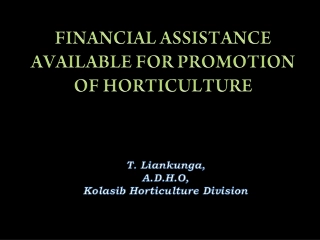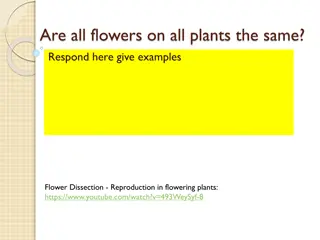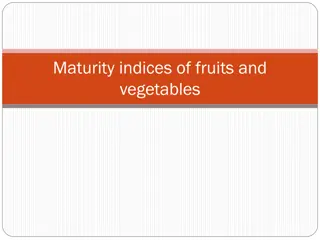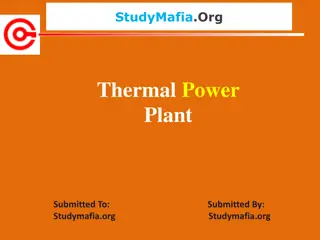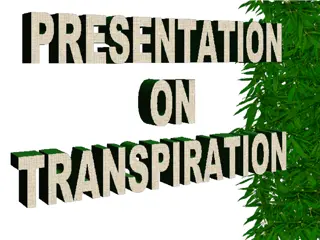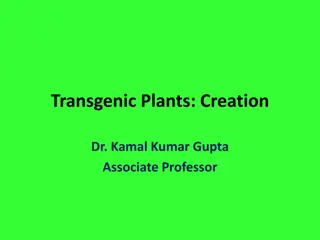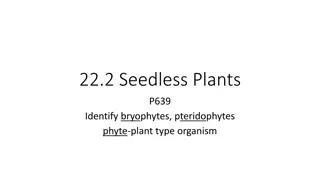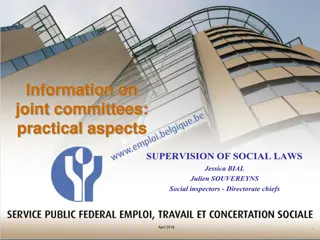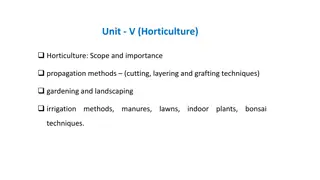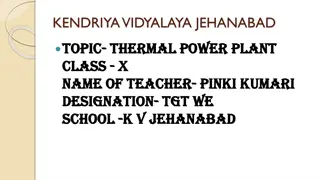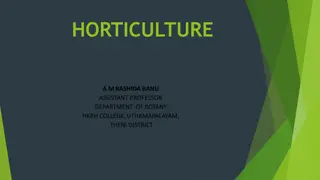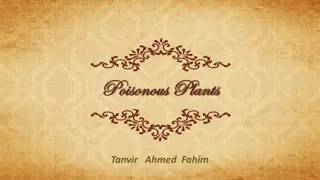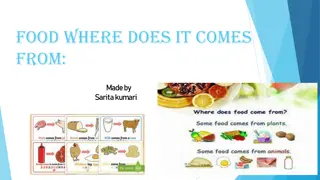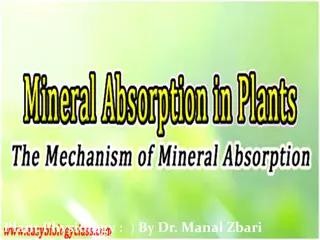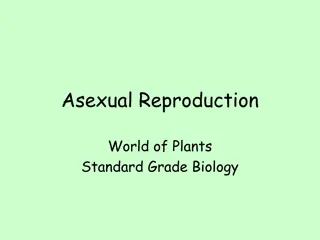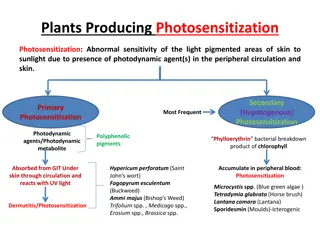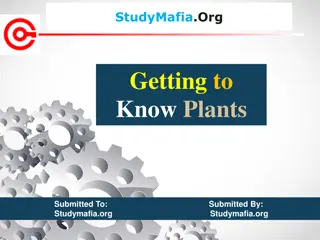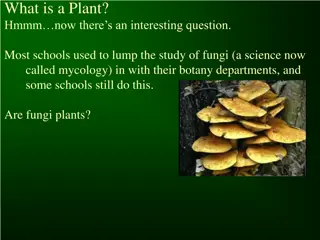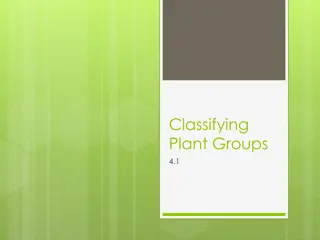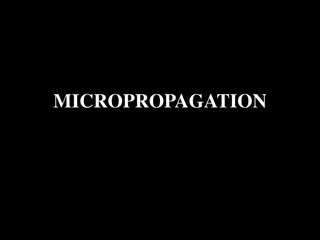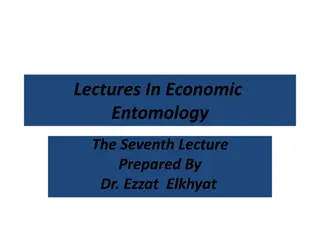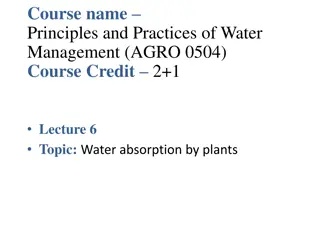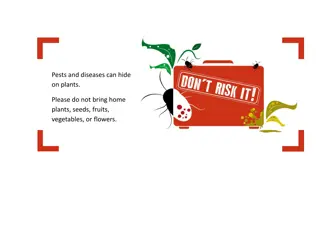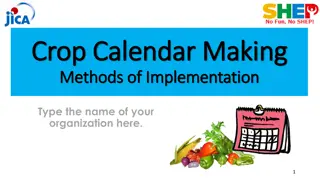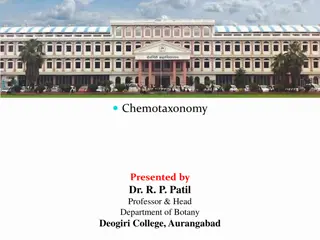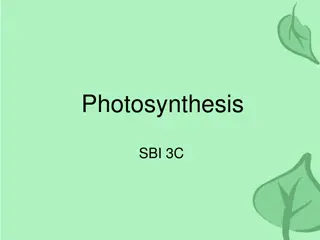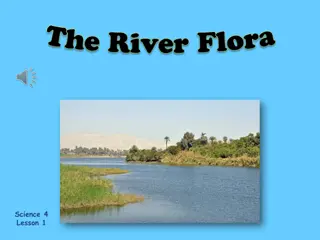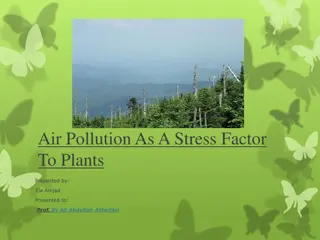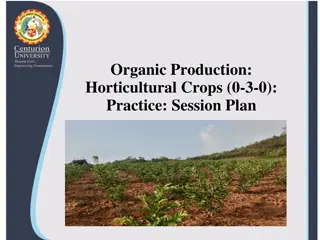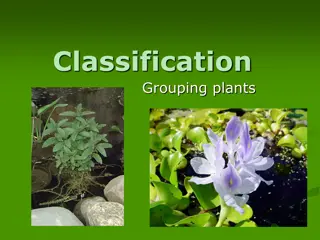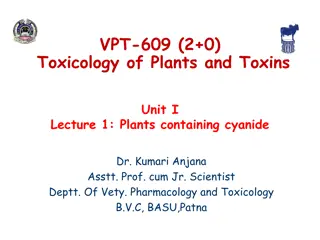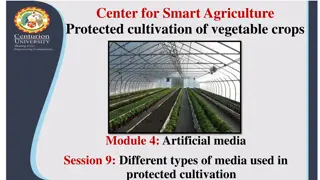Horticulture Promotion Scheme in Mizoram
The program aims to assist farmers in Mizoram with horticulture initiatives by providing financial support for nursery development, seed production, infrastructure, and crop expansion. Details include cost norms and assistance patterns for various horticultural activities.
0 views • 17 slides
Technological Innovations in Horticulture Sector of India
Technological innovations have played a crucial role in the development of horticulture in India, with the sector contributing significantly to the Gross Value Addition. Innovations include high-yielding and disease-resistant crop varieties, innovative production technologies, post-harvest managemen
1 views • 10 slides
Analysis and Modelling of Specific Energy Consumption in Thermal Power Plants
This analysis focuses on the specific energy consumption for the transportation of coal ash slurries in thermal power plants using Computational Fluid Dynamics (CFD). The study emphasizes the efficiency factor in energy consumption and its impact on the national economic engine. It also discusses th
1 views • 27 slides
Energy Production
Explore different aspects of energy production and efficiency in thermal power plants, water heaters, coal-fired electrical generation plants, and natural gas electrical generation plants. Learn about energy density, mass calculations, overall efficiencies, and specific energy requirements in these
7 views • 57 slides
One of the Best service for Garden Maintenance in Chapeltown
T&N's Garden Landscape serves the Best service for Garden Maintenance in Chapeltown. They approach each project with a blend of creativity, horticultural expertise, and a deep understanding of their clients' desires. Their goal is to not just meet expectations but to exceed them, ensuring that your
0 views • 6 slides
TNAES & TNHS-Agriculture and Horticulture jobs in Tamil Nadu
The Tamil Nadu Public Service Commission (TNPSC) conducts Tamil Nadu Agricultural Extension Service and Tamil Nadu Horticultural Service Exams (TNAES & TNHS) to select individuals for Agricultural Officer (Extension), Assistant Director of Agriculture (Extension) and Horticultural Officer posts.\nTo
11 views • 5 slides
Understanding Flower Variations in Plants
Explore the diverse world of flowers in plants through examples and explanations of their reproductive parts and processes. Discover how some plants have both male and female flowers, while others have separate sex flowers. Learn about perfect flowers, the female and male parts of a flower, and the
0 views • 12 slides
Understanding Maturity Indices of Fruits and Vegetables
Maturity in fruits and vegetables is crucial for proper ripening, storage, and transportation. Picking produce at the right stage impacts flavor, quality, and shelf life. Harvesting too early or too late can result in issues like flavor loss, faster deterioration, and lower yields. Learn about the i
1 views • 24 slides
Understanding Thermal Power Plants: Overview and Operation
Thermal power plants play a crucial role in converting heat energy into electricity for various applications. This article covers the definition, layout, working principle, and components of thermal power plants, highlighting their advantages and top features. From converting heat into mechanical po
0 views • 20 slides
Understanding Transpiration and Gas Exchange in Plants
Transpiration is the evaporation of water from plants, mainly occurring through the leaves' stomata. Plants exchange gases like CO2 and O2 through various parts, without specialized organs. The process aids in photosynthesis, respiration, and cooling, demonstrating the importance of transpiration in
0 views • 22 slides
Understanding Transgenic Plants and Agrobacterium Tumefaciens in Plant Biotechnology
Creation of transgenic plants involves various methods such as microprojectile DNA-coating, electroporation, and Agrobacterium transformation. Agrobacterium tumefaciens, a soil bacterium, plays a crucial role in inducing crown gall disease in plants by transferring T-DNA from the Ti plasmid. The Ti
1 views • 27 slides
Understanding Seedless Plants: Bryophytes and Pteridophytes
Explore the world of seedless plants through bryophytes and pteridophytes. Learn about the characteristics of green algae, the life cycles of these plants, and how vascular tissue impacts their growth. Discover the limitations and importance of vascular tissue in plants, from the small yet significa
0 views • 8 slides
Practical Aspects of Joint Committees - April 2018
Explore relevant joint committees including JC 323 for building management and domestic workers, JC 145 for horticultural enterprises, and JC 337 for the non-profit sector. Learn about job classifications, applicable salary scales, and employer interventions in transport expenses for workers in thes
1 views • 28 slides
Understanding Horticulture: Scope, Importance, and Propagation Methods
Horticulture, a crucial branch of agriculture, focuses on garden crops, intensively cultivated plants for food, medicine, and aesthetics. Discover the scope and significance of horticulture in improving land productivity, generating employment, boosting economic conditions, and providing nutritional
0 views • 26 slides
Understanding Thermal Power Plants in India
Explore the significance of thermal power plants in India, focusing on their generation capacity, coal-based operations, and key players like NTPC. Learn about the principles, layouts, waste management, and power output of these plants. Dive into a list of major thermal power plants across the count
0 views • 21 slides
Understanding the Basics of Horticulture
Horticulture encompasses the cultivation, processing, and sale of fruits, nuts, vegetables, and ornamental plants. The term originated from the Latin words "Hortus" meaning garden and "Colere" meaning to grow. With roots dating back to the 17th century, horticultural science has evolved through the
3 views • 30 slides
Understanding Poisonous Plants and Their Effects on Humans
Poisonous plants can have deleterious effects on individuals, leading to severe consequences and even death if not managed properly. These plants produce toxins that interfere with the body's essential functions, ultimately causing impairment and potential fatality. Recognizing the grades of poisoni
0 views • 11 slides
Understanding Food Sources: Plants and Animals Explained
Food is essential for nourishing our bodies, and it comes from either plants or animals. Plants provide fruits, vegetables, grains, and more, while animals offer products like meat, milk, and eggs. Different parts of plants, such as roots, stems, and leaves, are consumed as food. Animals have varied
0 views • 11 slides
Implementation Guidelines for Stakeholder Forum in Agricultural Development
Learn about the implementation methods for organizing a Stakeholder Forum in agricultural development projects. Discover the objectives, outline, and key tips for successful engagement between farmer representatives and market stakeholders. Enhance business opportunities and linkages in horticultura
0 views • 15 slides
Mineral Absorption in Plants: Mechanisms and Types
Plants absorb minerals from the soil as ions through the roots, with the process of mineral absorption being distinct from water absorption. Mineral absorption in plants can occur through passive or active methods, each involving different mechanisms and energy requirements. Passive absorption is a
0 views • 14 slides
Asexual Reproduction in Plants: Methods and Examples
Asexual reproduction in plants, also known as vegetative propagation, involves various methods such as tubers, bulbs, and runners. It allows plants to reproduce without the involvement of sex cells and fertilization, resulting in genetically identical offspring. Artificial propagation techniques lik
0 views • 11 slides
Understanding Photosensitization in Plants: Causes and Toxicity
Photosensitization in plants can lead to abnormal skin sensitivity to sunlight, caused by the presence of photodynamic agents in the skin and peripheral circulation. Primary and secondary photosensitization are common, with various plants and toxins contributing to liver damage and biliary occlusion
0 views • 12 slides
Exploring the World of Plants: An Overview
Plants play a vital role in sustaining life on Earth by producing food and oxygen. This comprehensive guide delves into the diverse types of plants, such as herbs, shrubs, trees, creepers, and climbers. It also discusses the essential components of plants, like leaves, transpiration, and photosynthe
0 views • 20 slides
A Closer Look at Plants and Their Importance in Our Ecosystem
Plants play a vital role in our ecosystem, not only through photosynthesis but also in regulating atmospheric gases like oxygen and carbon dioxide. Understanding the definition of plants, from green algae to flowering plants, is essential. By studying plants, we uncover their critical contribution t
0 views • 12 slides
Understanding Plant Classification and Characteristics
Discover the classification of plants based on their structures and characteristics, including vascular vs. nonvascular plants, seed plants vs. seedless plants, and the definitions of angiosperms, gymnosperms, dicots, and monocots. Learn about the history of plant classification and how plants are g
0 views • 27 slides
Understanding Micropropagation: A Clonal Propagation Method
Micropropagation is a popular method for vegetative propagation in plants, providing genetically identical copies through aseptic tissue culture techniques. This technique allows for mass production of true-to-type plantlets in a short time, crucial for the commercial propagation of horticultural cr
0 views • 42 slides
Understanding Economic Entomology: A Focus on Pest Management in Horticultural Plants
Explore the world of economic entomology and delve into the study of insects that either benefit or harm humans and their products. Learn about the general definitions of pests, taxonomy of pests, and why insect pests are considered the most important group of pests. Discover the impact of insect pe
0 views • 24 slides
Water Absorption by Plants: Mechanisms and Adaptation Strategies
Understanding water absorption by plants is crucial for effective water management in agriculture. Plants absorb water through active and passive methods, driven by osmotic and non-osmotic processes. Root hairs play a significant role in facilitating water uptake, with mechanisms such as osmotic act
0 views • 26 slides
Beware of Pests and Diseases on Plants - Protect Your Home Garden
Pests and diseases can easily hide on plants, seeds, fruits, vegetables, and flowers, posing a threat to your home garden. Bringing infected plants home can lead to widespread infestations and damage. It's crucial to be vigilant and avoid importing potentially contaminated greenery. Stay informed, i
0 views • 4 slides
Empowering Farmers Through Crop Calendar Making
This guide outlines a comprehensive approach to empowering farmers through Crop Calendar Making, enabling farmer groups to plan production and marketing activities collectively. The process involves various steps such as raising awareness, decision-making, acquiring skills, and implementing annual p
0 views • 15 slides
Understanding Chemotaxonomy: Classification of Plants Based on Chemical Constituents
Chemotaxonomy, presented by Dr. R. P. Patil, explores the scientific investigation of the chemical characters in plants for taxonomy and phylogeny studies. It involves classifying plants based on their chemical constituents and molecular characteristics. Principles, methods, and importance of chemot
0 views • 24 slides
Understanding Photosynthesis: The Process of Energy Conversion in Plants
Photosynthesis is a vital process where plants, algae, and cyanobacteria convert light energy from the sun into chemical energy in the form of glucose. This energy conversion involves the absorption of light by chlorophyll molecules in chloroplasts, leading to the generation of ATP and the formation
0 views • 12 slides
Diversity of Plants in Rivers and Streams
In rivers and streams, a variety of plants play essential roles by providing shelter, food, and oxygen to animals. From white poplar to water lilies, different plants thrive along riverbanks and in water bodies, contributing to the ecosystem's health and balance. Aquatic plants like water lettuce an
0 views • 6 slides
Understanding Air Pollution Stress on Plants
The impact of air pollution on plants is a significant concern, affecting their physiology and overall health. Various air pollutants, such as sulfur dioxide, ozone, and nitrogen compounds, have been identified as phytotoxic agents, leading to severe or subtle effects on plant life. Detecting the ef
0 views • 21 slides
Organic Seed Treatment Techniques for Improved Horticultural Crop Production
Explore the benefits of organic seed treatment methods for horticultural crops, such as priming, pelleting, and seed health treatments. Learn how these techniques can enhance germination rates, protect against pathogens, and optimize planting accuracy in organic farming practices.
0 views • 14 slides
Plant Classification and Reproduction Overview
Plants are categorized into four groups: Mosses, Ferns, Conifers, and Flowering Plants. Mosses reproduce by spores and lack roots or xylem vessels. Ferns reproduce via spores, while conifers reproduce with seeds found in cones and have needle-shaped leaves. Flowering plants reproduce using seeds fou
0 views • 8 slides
Understanding Cyanogenic Plants and Cyanide Poisoning in Animals
This lecture introduces the toxicology of plants containing cyanide, focusing on factors affecting cyanide poisoning, cyanogenic plants, mechanisms of toxicosis, clinical signs, post-mortem lesions, diagnosis, treatment, and prevention. It discusses species variations in susceptibility, plant growth
0 views • 22 slides
Supportive Mental Health Services in Aberdeenshire by MyLifeDynamic
MyLifeDynamic offers a range of services in Aberdeenshire to support individuals facing mental health challenges and autism. They provide resilience coaching, listening projects, horticultural therapy, wellness support, and peer assistance. Through referrals and self-enquiries, they create a confide
0 views • 13 slides
Understanding Different Types of Artificial Media for Protected Cultivation
Exploring soil-less media for growing horticultural crops, this module delves into the advantages of using artificial media in protected cultivation. From soil mixes to peat, perlite, and vermiculite, learn how these components offer benefits like improved aeration, nutrient control, and labor effic
0 views • 21 slides
Understanding Monocot Plants: Features and Families
Monocotyledon plants, a significant group of flowering plants, have unique characteristics such as adventitious roots, parallel-veined leaves, and flowers with parts in sets of three or four. The Poaceae family, including economically important grasses, and the Cyperaceae family, known as sedges, ar
0 views • 7 slides
